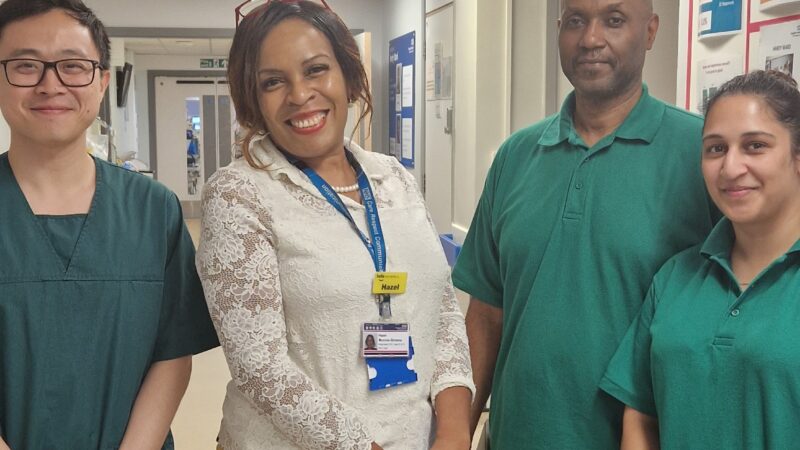The discharge support workers make up part of a multidisciplinary team that also includes health and social care professionals and organisations from the voluntary sector. The team works together to form the Transfer of Care Hub which promotes and supports a safe and timely discharge for patients from hospital. Working with partners from the wider system is crucial to ensure that this is done effectively.
The results of the hub expansion are already being felt. Improvements have been made to the homeless patient pathway, with individuals being discharged quickly after they have been assessed. This has freed up beds which were often being used by those that didn’t have anywhere to go other than back to the streets. Now the team works closely with colleagues from Kingston and Richmond Councils, the ICB, Teddington Memorial Hospital and local voluntary sector organisations to make sure that these people have somewhere safe to go while they recover.
The hub has also produced a significant reduction in the amount of time that long length of stay patients stay in hospital before being discharged, by implementing dedicated meetings with partners once or twice a week. The number of long stay patients that were in hospital longer than 21 days stood at 131 this time last year and has now fallen to 78, an achievement that Integrated System Transfer of Care Hub Lead, Hazel Munroe-Browne, is proud of. She said: “I come from a nursing background, which I think helps as I understand the clinical issues patients face as well as the processes needed to get people out of hospital and into the right environment for them. I am proud of the work of the Transfer of Care Hub and the difference we are making to the flow of the hospital. By making sure plans are in place before a patient is ready to leave, we free up the time of Discharge Support Nurses, improve the flow of the hospital and ultimately improve the experience of patients.
By making sure plans are in place before a patient is ready to leave, we free up the time of Discharge Support Nurses, improve the flow of the hospital and ultimately improve the experience of patients.”
Integrated System Transfer of Care Hub Lead, Hazel Munroe-Browne
“My role makes me think outside of the box and every day is different. The best compliment I have ever received from a patient was that I was the best travel agent they’d ever had and that has really stayed with me”.
The hub has also made a marked improvement for those who need to be fast tracked for end-of-life care leaving the hospital and being discharged into the right environments for them where they get to spend their last days in comfort and dignity. Previously, these patients could wait up to 22 days before being transferred, but now this is often achieved within a day. Hazel said: “All hospital discharge is important to us, but this to me is the most important. You get only get one chance to make sure someone has a good death, and we work very hard to achieve this for all our end-of-life patients.”
Each Discharge Support Worker covers one or two wards, which can have up to 50 beds each, and aims to identify patients and their individual needs within the first 24 hours of them being admitted to hospital. This meana that there is a plan for discharge which can be put in place as soon as they are ready to leave.
Discharge Support Worker, Dan Lotek, said: “This role is great as it varies so much from day to day. Really, supporting complex discharge cases is like connecting the dots. Each patient is different, they’re from different boroughs, they have different needs and different priorities. It is our job to make sure all of this is considered on a case-to-case basis, working in partnership to get them where they need to go.”
Discharge support worker Zohrah Akhtar works with the Acute Assessment Unit, she added: “I work with patients before they are even admitted to a ward, starting their discharge process from scratch. Clinical staff work to get people well enough to go home, and it is my job to start getting the plans in place to make sure this can happen safely. We are under a lot of pressure to get the process right so that there are enough beds for everyone that needs one.”
